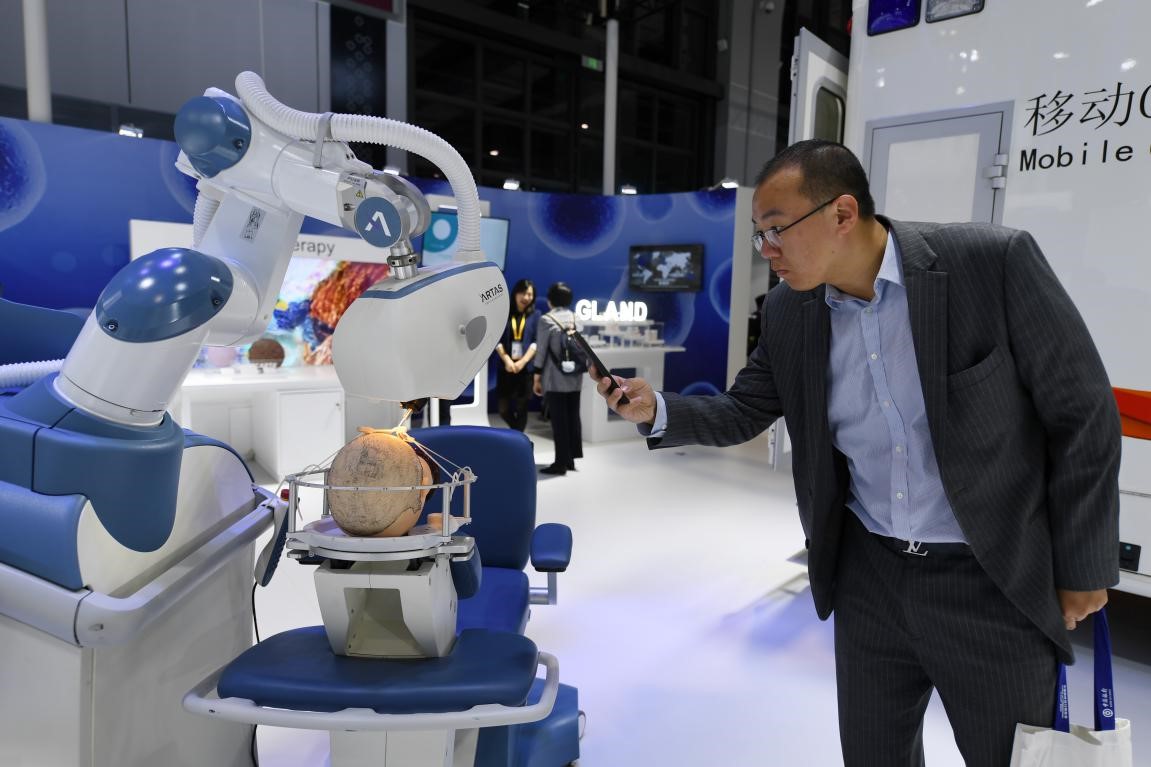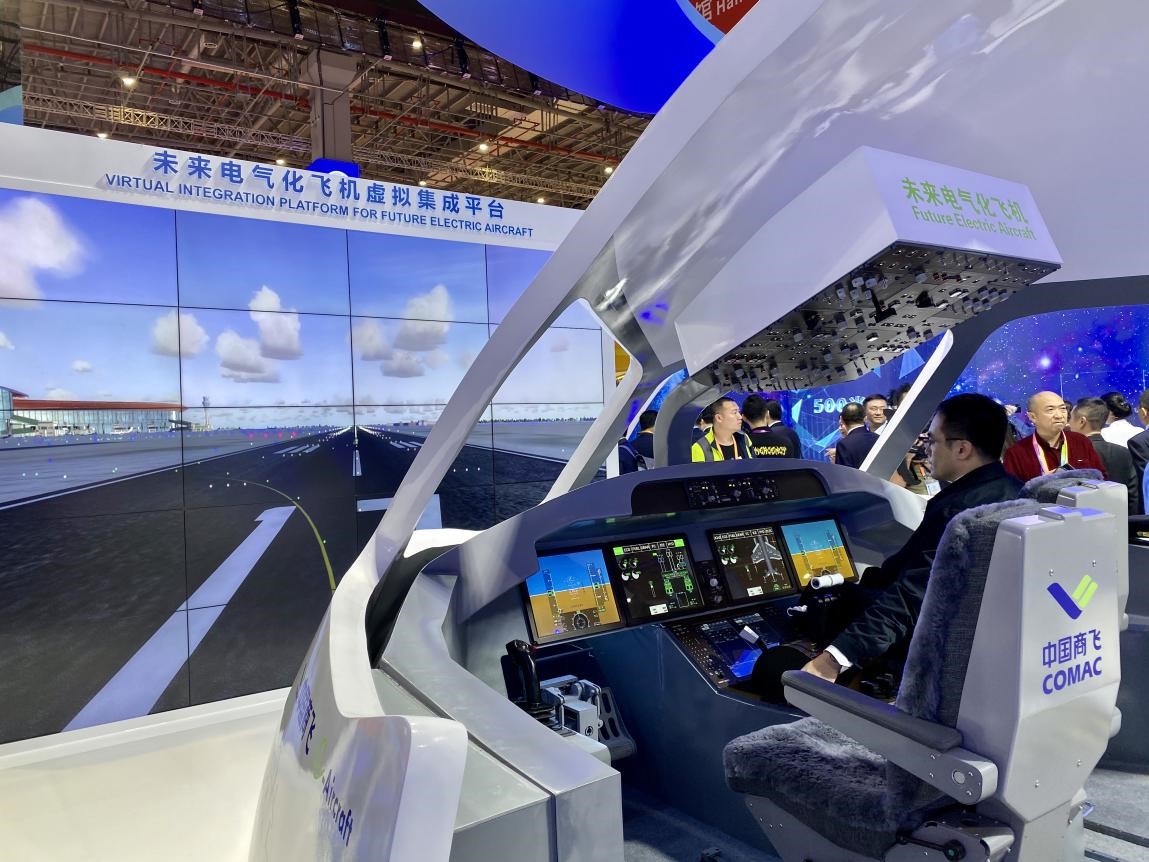


A staff member displays a smart surgical instrument to a visitor at the booth of American medical equipment producer Medtronic during the second CIIE. (Photo by Ji Peijuan from People’s Daily)
Win-win cooperation has always been the theme of global development and economic globalization always remains an irresistible trend.
This can be well explained by the importance attached by US enterprises to the Chinese market.
Last year, over 100 US enterprises attended the China International Import Expo (CIIE), and their total exhibition area stood at 36,000 square meters, ranking among the top three in all participating countries. This year, the number of US exhibitors increased to over 190, and their total exhibition area has hit 47,500 square meters, the highest in all participating countries.
“Economic globalization represents the trend of history. Like the world’s great rivers, the Yangtze, the Nile, the Amazon and the Danube — they all surge forward in relentless flow, and nothing can stop their mighty movement, not the current of undertows or hidden shoals or rocks beneath the water,” Chinese President Xi Jinping said in his keynote speech delivered at the opening ceremony of the second CIIE.
Comparing economic globalization to mighty rivers, Xi profoundly revealed the irreversibility of economic globalization. Against the background of rising trade protectionism and anti-globalization, this far-sighted judgment is even more insightful and significant, indicating China’s sense of responsibility.
Economic globalization is an inevitable result of the advancement of science and technology and the development of productivity in human society. The first Industrial Revolution led to the international division of labor, which enabled British cotton mills to process cotton from all over the world, and made cotton the earliest globalized commodity.
Since the 1970s, the information revolution has swept the world. The digital economy represented by the Internet has enabled people to live in a “global village” where everyone is closely connected like neighbors.

A visitor takes photo of a hair transplant robot at the second CIIE. (Photo by Weng Qiyu from People’s Daily)
At present, a new round of scientific and technological revolution and industrial transformation featuring artificial intelligence, big data, quantum communication and block chain is gathering strength.
Being open and sharing, these technologies will further promote the in-depth development of economic globalization, which is in line with the laws of history, represents the trend of times, and won’t be changed at the will of anyone.
In a global market with free flow of production factors, different countries should give full play to their respective advantages, engage in healthy competition, and make wealth and improve people’s livelihood through trade activities. The CIIE is exactly a platform to achieve that.
Thanks to the first CIIE, jute handcrafts made in poverty-stricken areas of Bangladesh have entered the high-end department stores in Shanghai, and fresh fruits from Hawaii have been introduced to the bubble tea shops across China. Besides, Italian manufacturers of internet-famous household appliances are now joining Chinese e-commerce enterprises for larger market.
Free trade has created a truly win-win situation, and the process of economic globalization has greatly promoted the growth of wealth and social development. As an old Chinese saying goes, the wise build bridges while the fool build walls. If a country pursues isolation, resorts to the beggar-thy-neighbor practice, or even puts its private interests above the interests of all humanity, it will only end up harming the others without benefiting itself.

A visitor experiences virtual airplane piloting in a simulated cabin at the Chinese Pavilion of the second CIIE. (Photo by Wang Xiaobo from People’s Daily)
Economic globalization is unstoppable, and so is the aspiration of all countries for peace and development. Since the founding of the People’s Republic of China 70 years ago, especially over the past 40 years of reform and opening up, China has actively integrated into the global market and participated in the international division of labor, and gradually developed into the world’s second largest economy.
Nowadays, more developing countries hope to learn from China’s successful experience, expand opening-up in a fair and orderly international environment, and be fully involved in the process of economic globalization so as to create more wealth in international trade and secure a better future.
No one can stop the people around the world from moving towards a better life, and no one can stifle their desire for peace, development and progress.
China is building three bridges: one to the world, one to prosperity and one to the future, said Christine Lagarde, former managing director of the International Monetary Fund (IMF) at the first CIIE.
China is a staunch vindicator of economic globalization, a firm defender of free trade and a faithful constructor of a better future for mankind. While opening its door wider to the world, the country will take more concrete actions and measures to advance economic globalization.
 Fire brigade in Shanghai holds group wedding
Fire brigade in Shanghai holds group wedding Tourists enjoy ice sculptures in Datan Town, north China
Tourists enjoy ice sculptures in Datan Town, north China Sunset scenery of Dayan Pagoda in Xi'an
Sunset scenery of Dayan Pagoda in Xi'an Tourists have fun at scenic spot in Nanlong Town, NW China
Tourists have fun at scenic spot in Nanlong Town, NW China Harbin attracts tourists by making best use of ice in winter
Harbin attracts tourists by making best use of ice in winter In pics: FIS Alpine Ski Women's World Cup Slalom
In pics: FIS Alpine Ski Women's World Cup Slalom Black-necked cranes rest at reservoir in Lhunzhub County, Lhasa
Black-necked cranes rest at reservoir in Lhunzhub County, Lhasa China's FAST telescope will be available to foreign scientists in April
China's FAST telescope will be available to foreign scientists in April "She power" plays indispensable role in poverty alleviation
"She power" plays indispensable role in poverty alleviation Top 10 world news events of People's Daily in 2020
Top 10 world news events of People's Daily in 2020 Top 10 China news events of People's Daily in 2020
Top 10 China news events of People's Daily in 2020 Top 10 media buzzwords of 2020
Top 10 media buzzwords of 2020 Year-ender:10 major tourism stories of 2020
Year-ender:10 major tourism stories of 2020 No interference in Venezuelan issues
No interference in Venezuelan issues
 Biz prepares for trade spat
Biz prepares for trade spat
 Broadcasting Continent
Broadcasting Continent Australia wins Chinese CEOs as US loses
Australia wins Chinese CEOs as US loses